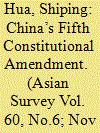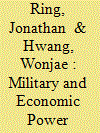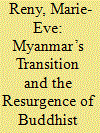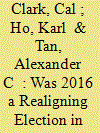|
|
|
Sort Order |
|
|
|
Items / Page
|
|
|
|
|
|
|
| Srl | Item |
| 1 |
ID:
176139


|
|
|
|
|
| Summary/Abstract |
The policy orientations reflected in the fifth amendment to China’s constitution combine some elements of Maoism (an emphasis on ideology, the party, and personality cult); some of the constitutional formality of the Republican era (1912–1949), such as Sun Yat-sen’s Wuquan Xianfa (Five Powers Constitution); and some elements of the legal tradition of China’s imperial past. These policy orientations were justified by a Maoist philosophical voluntarism: the relative detachment between the “economic base” and the “superstructure” justified the persistence of the Chinese cultural tradition and the notion that political reform does not have to accompany economic reform. On those areas that do not represent an imminent threat to the regime, such as economics and law in general, the fifth amendment is purposely vague, to give the regime flexibility in policymaking.
|
|
|
|
|
|
|
|
|
|
|
|
|
|
|
|
| 2 |
ID:
176137


|
|
|
|
|
| Summary/Abstract |
In July 2018, the Korean National Pension Service (KNPS), one of the world’s largest pension funds, introduced a stewardship code, and in February 2019 it first exercised active shareholder engagement in an investee. Using an event study methodology, we examine whether this institutional investor’s active shareholder engagement affected the stock market. We find that the stock value of the KNPS’s investees was reduced after the active shareholder engagement. The effect was larger in the case of small-cap stocks, companies in which the KNPS has a 5–10% share, and firms with a lower environmental, social, and governance grade. This implies that market concerns about government intervention are valid, and institutional reforms are necessary, including specific guidelines to balance shareholder and management rights.
|
|
|
|
|
|
|
|
|
|
|
|
|
|
|
|
| 3 |
ID:
176136


|
|
|
|
|
| Summary/Abstract |
Is the Kim Jong-un regime genuinely pursuing a peaceful solution, to eventually give up its nuclear arsenal, after a series of summits and negotiations with the US and South Korea? We examine how military and economic power networks on the peninsula are associated with the prospect of North Korea’s denuclearization. North Korea could use its nuclear weapons program, an internal tool designed to promote national security and power, to build up power in both military and economic power networks. Drawing lessons and speculation from the literature on states’ hedging behavior, and using agent-based models, we explain that denuclearization as part of a hedging strategy would be a viable policy option for North Korea.
|
|
|
|
|
|
|
|
|
|
|
|
|
|
|
|
| 4 |
ID:
176135


|
|
|
|
|
| Summary/Abstract |
Myanmar began a transition in 2011 that ended almost 50 years of military rule. During the transition, a nationalist movement called for protecting Buddhism from an “Islamic threat.” Anti-Islam nationalism was not new in Burmese history, yet the timing of its resurgence deserves attention. I argue that the incumbents’ anticipated electoral weakness in transitional elections was the primary reason for its resurgence. The incumbents sought to maximize societal support, and they faced a strong contender, the National League for Democracy, whose probability of winning was high. Social opposition was also significant by the time military rule ended. In a campaign to pass reforms to better “protect” Buddhism, the incumbents used monks to cast doubt on the NLD’s ability to represent Buddhist interests and to recruit former regime opponents who were nationalists. The incumbents garnered wide support for the reforms, yet it was insufficient for an electoral victory.
|
|
|
|
|
|
|
|
|
|
|
|
|
|
|
|
| 5 |
ID:
176134


|
|
|
|
|
| Summary/Abstract |
Political families are common across many countries in Asia, including Pakistan. Politicians from political families (PPFs) make decisions with the goal of maximizing the political prospects of the entire family, in contrast to non-PPFs, who maximize their individual political self-interest. This changes the impact they have on their country. Scholars find that the presence of PPFs is associated with significantly worse development and governance outcomes, including in Pakistan. However, we know much less about their impact on political outcomes. In this paper, we use original data from a 2018 systematic national survey of about 150 Pakistani politicians to investigate PPFs’ support for key democratic institutions and practices. We find that compared to non-PPFs, Pakistani PPFs are significantly more supportive of instrumentally useful institutions and practices such as free and fair elections, an independent judiciary, and a free media, but no different in their low level of support for human rights.
|
|
|
|
|
|
|
|
|
|
|
|
|
|
|
|
| 6 |
ID:
176132


|
|
|
|
|
| Summary/Abstract |
The January 2016 presidential and legislative elections in Taiwan produced a dramatic and unprecedented victory for the Democratic Progressive Party over its long-time rival, the Kuomintang. The party had never had a parliamentary majority before 2016. The elections indicated the potential for fundamental change in Taiwan’s party system. This is what political scientists call a critical realigning election. The problem with identifying these elections, such as the 1896 and 1932 ones in the United States, is that we can only be sure of such an interpretation after a significant amount of time has passed. Still, some of the changes in Taiwan are fundamental enough to make such an evaluation worthwhile. We summarize realigning elections; discuss the factors that may lead to a change in the partisan balance; and describe the growing role of protest parties and social movements in Taiwan politics.
|
|
|
|
|
|
|
|
|
|
|
|
|
|
|
|
| 7 |
ID:
176133


|
|
|
|
|
| Summary/Abstract |
We present findings from eight nationally representative surveys conducted during the 2019 Indonesian presidential campaign, in which we measured voters’ reported belief in prominent pieces of misinformation. Younger, better-educated, and wealthier voters were more likely to believe the misinformation. These results are true for stories about both the incumbent (Joko Widodo) and the challenger (Prabowo Subianto). These findings represent a significant departure from results in Western Europe and North America, where a surge in misinformation has disproportionately targeted older and less educated voters.
|
|
|
|
|
|
|
|
|
|
|
|
|
|
|
|
| 8 |
ID:
176138


|
|
|
|
|
| Summary/Abstract |
Why do social movement participants turn to elections to advance their goals? Little scholarship has examined movement–election connections at the micro level, and cases from nondemocratic settings are few. After the 2014 Umbrella Movement in Hong Kong failed to achieve substantive results, very few occupiers ran as candidates in the next two general elections. Drawing on interviews with Umbrella candidates and campaign assistants, I argue that after being politicized by the occupation, those candidates used the authoritarian elections to prolong their challenge. They ran to prove that the occupation, though it had failed, did enjoy popular support, thus turning the elections into electoral “moments”: eruptions of civic energy. Their campaigns were also direct challenges to the existing parties. However, they were constrained by electoral logic. Candidates therefore devised various tactics to justify their decision, and to differentiate themselves from conventional candidates.
|
|
|
|
|
|
|
|
|
|
|
|
|
|
|
|
|
|
|
|
|